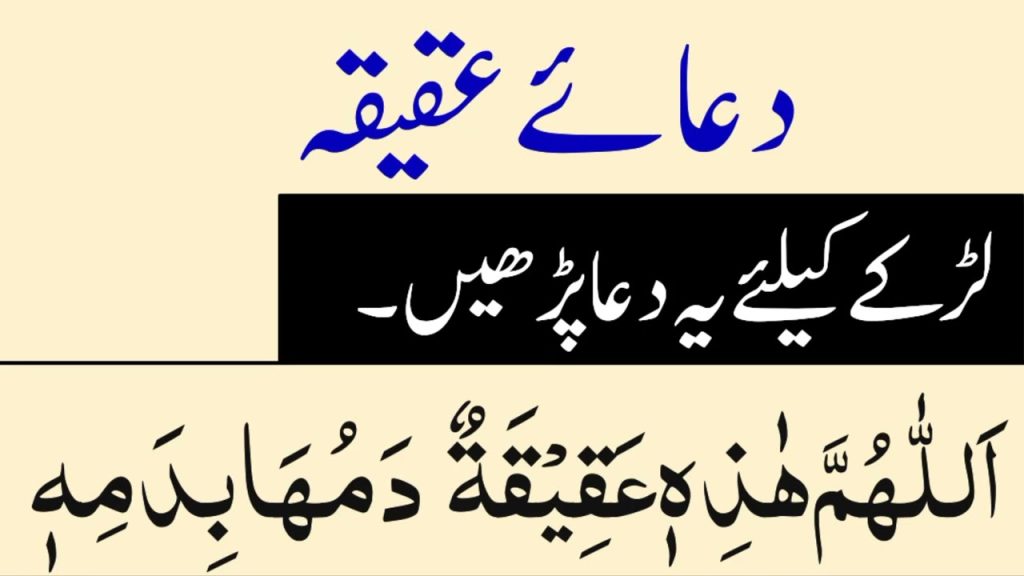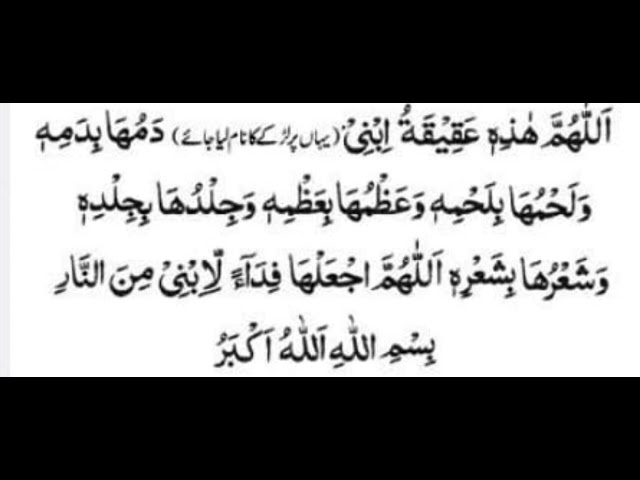Aqiqah Ki Dua: Complete Islamic Guide for Boys & Girls – 2025
Introduction – Why Aqiqah Matters
Assalāmualaykum! Jab mera pehla bacha paida hua, main bohot confused tha – especially about the proper aqiqah ki dua and method. Wells of information were everywhere: social media posts, WhatsApp forwards, different opinions… I didn’t know what was Sunnah authentic and what was just cultural. So I reached out to scholars and did proper research.
Today, main aap ke saath share kar raha hun meri personal journey and the complete aqiqah ki dua guide—from correct timing and etiquettes to heartfelt prayers. Believe me, when you do aqiqah with sincere intention and the right aqiqah ki dua, it’s much more than ritual; it feels like giving your child a blessed start in life.
Aqiqah Ki Dua for Boys
Authentic Arabic Dua for Your Son
اللَّهُمَّ هَذِهِ عَقِيقَةُ فُلَانٍ، دَمُهَا بِدَمِهِ… اللَّهُمَّ اجْعَلْهَا وِقَاءً لِفُلَانٍ مِنَ النَّارِ
Transliteration:
Allahumma hathihi aqiqatu fulanin, damuha bidamihi, lahmuha bilahmihi, azmuha biazmihi, sha‘ruha bisha‘rihi, wiljiduha bijildihi. Allahumma aj‘alha wiqā’an li‑fulān minas‑nār.
Translation:
O Allah! This is the aqiqah for [child’s name]; its blood for his blood, flesh for his flesh, bones for his bones, hair for his hair, and skin for his skin. O Allah, make it a protection from the Fire for [child’s name].
Why it’s authentic: This exact aqiqah ki dua is narrated for Hasan and Husayn رضي الله عنهما by Aisha (RA) in Imam al‑Bayhaqi’s Sunan al‑Kubra. It’s also endorsed as mustahab by Imam Nawawi (al‑Majmu‘) and found in Musannaf Ibn Abi Shaybah.
Additional Dua for Your Son’s Success
رَبَّنَا هَبْ لَنَا مِنْ أَزْوَاجِنَا وَذُرِّيَّاتِنَا قُرَّةَ أَعْيُنٍ…
(“Our Lord, grant us from our spouses and offspring comfort to our eyes, and make us leaders of the righteous.”) — Surah Al‑Furqān 25:74
This dua invites good character, strong faith, and parental pride into your son’s life.
Aqiqah Ki Dua for Girls
Arabic Dua with Feminine Form
The structure remains the same; simply change pronouns: فُلَانَةٍ for the daughter:
اللَّهُمَّ هَذِهِ عَقِيقَةُ فُلَانَةٍ… اللَّهُمَّ اجْعَلْهَا وِقَاءً لِفُلَانَةٍ مِنَ النَّارِ
Use this aqiqah ki dua with your daughter’s name—invoking protection and blessings just like for boys.
Urdu Translation & Emotional Blessing
“اے اللہ، یہ [beti ka naam] کی عقیقہ ہے۔ اس کا گوشت اس کے گوشت کے بدلے… اور اسے دوزخ کی آگ سے بچا لے۔”
This direct, emotional aqiqah ki dua resonates deeply with families, as it affirms the importance and joy of daughters in our society.
Extra Dua for Daughters
“ربنا ہمیں ہماری بیٹیوں میں آنکھوں کا نور بننے والی اولاد عطا فرما…”
A heartfelt prayer for daughters’ happiness and spiritual growth.
Aqiqah Ki Dua Tarika – Step-by-Step Method
1. Timing & Sunnah Order
- 7th day after birth is ideal (strong Sunnah).
- If not possible: do it on the 14th or 21st day.
- Any later is acceptable if unavoidable—but intention is key.
2. Pre-Slaughter Preparation
- Perform Wudu; state your niyyah clearly:
“This aqiqah is for [child’s name].” - Ensure animal is healthy, face Qiblah, and recite Takbeer + Bismillah.
3. During Slaughter
- Use a sharp, humane knife for quick cut.
- Recite Bismillah Allahu Akbar, then the Arabic aqiqah ki dua shared above.
4. After Slaughter Ceremony
- Say Alhamdulillah.
- Distribute the meat:
- 1/3 to the needy,
- 1/3 to family and neighbors,
- 1/3 for home use.
- Optionally: shave the baby’s head and donate the weight in silver or money.
- Name the child and give the Adhan in right ear, if practiced.
5. Closing Gratitude & Dua
- Say Durood Sharif 11 times.
- Give final supplications: “Allah Ta’ala is bachay ko naiki se bhar de, uske walidain ko aankhon ka thandak bana de…”
Modern Adaptations: Making It Easy & Meaningful
- Hire a professional butcher for clean, shariah-compliant slaughter.
- Use a masjid or community hall for hosting larger aqiqah gatherings.
- Keep refrigeration ready for timely meat distribution.
- Capture special moments photographically (within Islamic decorum).
Create this as a learning experience for older siblings—teaching them gratitude, charity, and piety.
Avoiding Common Mistakes
- ❌ Choosing poor-quality animals
- ❌ Delaying unnecessarily without reason
- ❌ Skipping the full aqiqah ki dua
- ❌ Failing to distribute meat properly
- ❌ Treating it as a mere formality rather than heartfelt ritual

Why Aqiqah Matters in Our Children’s Lives
You know, jab mera pehla bacha paida hua tha, main bohot confused tha about aqiqah ki proper procedure. Honestly speaking, social media par itni different information mil rahi thi ke samajh nahi aa raha tha ke kya sahi hai aur kya galat. That’s when I decided to properly research aqiqah ki dua aur authentic Islamic sources se seekhna.
Main yahan share kar raha hun everything jo maine personally experience kiya hai aur jo scholars se confirm kiya hai. Trust me, when you do aqiqah with proper intention aur correct dua, it feels like you’re giving your child the best possible start in life. It’s not just a ritual – it’s actually a beautiful way to express gratitude to Allah for this amazing blessing.
The thing is, aqiqah sirf meat distribute karna nahi hai. There’s so much more to it – proper timing, specific duas, aur certain etiquettes jo follow karne chahiye. Aaj main aap ke saath complete guide share kar raha hun jo hopefully helpful hogi for new parents.
Aqiqah Ki Dua for Boy: Special Prayers for Your Son
The Primary Dua for Boys
Actually, mujhe yaad hai jab mere bete ka aqiqah hua tha – main kitna nervous tha! Imam sahib ne dekha ke main confused hun, toh unhon ne bola ke tension mat lo, yeh aqiqah ki dua padh lo:
Basically yeh dua ka matlab hai ke Allah se bachche ki protection maang rahe hain. Main toh honest confession kar raha hun – pehli baar padhte time pronunciation mein struggle kiya tha, but imam sahib ne patience se sikhaya.
Translation: “O Allah, this is the aqiqah of [child’s name]. Its flesh for his flesh, its blood for his blood, its bones for his bones, its hair for his hair, and its skin for his skin. O Allah, make it a protection for [child’s name] from the Fire.”
Sach kehun toh, us waqt bohot emotional moment tha. You know that feeling jab aap pehli baar properly realize karte hain ke ab aap papa ban gaye hain? Yeh dua padhte time exactly wahi feel hua. Protection maangna apne bachche ke liye – it’s the most natural thing as a parent, na?
Additional Prayers for Your Son’s Success

Along with the main dua, main yeh additional prayers bhi karta hun during aqiqah:
دُعَاءُ الْوَالِدَيْنِ لِلْوَلَدِ “Rabbana hab lana min azwajina wa dhurriyyatina qurrata a’yunin wa’jalna lil-muttaqeena imama”
This dua basically asks Allah to make our children the coolness of our eyes aur righteous leaders. For boys especially, main yeh pray karta hun ke Allah unhe good character aur strong faith de.
aqiqah ki dua Roman Transliteration
Explanation:
- Roman transliteration means writing Arabic words using the English alphabet.
- It helps non-Arabic speakers and those who can’t read Arabic or Urdu script pronounce the duas correctly.
- Example:
Arabic: اللَّهُمَّ هَذِهِ عَقِيقَةُ فُلَانٍ
Roman: Allahumma hadhihi ‘aqiqat-u fulanin…
aqiqah ki dua Urdu & English Translations
- Here is the Aqiqah ki Dua in Arabic, its Roman transliteration, and English translation — ideal for your article or personal use:
Aqiqah Ki Dua in Arabic:
اللَّهُمَّ هَذِهِ عَقِيقَةُ فُلَانٍ، لَحْمُهَا بِلَحْمِهِ، وَدَمُهَا بِدَمِهِ، وَعَظْمُهَا بِعَظْمِهِ، اللَّهُمَّ اجْعَلْهَا وِقَاءً لِفُلَانٍ مِنَ النَّارِ
Roman Transliteration:
Allahumma hadhihi ‘aqiqat(u) fulaanin, lahmuha bilahmihi, wa damuha bidamihi, wa ‘azmuha bi‘azmihi. Allahumma aj‘alha wiqā’an li-fulaanin min an-nār.
Note: Replace “fulaanin” with the child’s name (e.g., Zayd, Fatima, etc.)
Aqiqah Ki Dua in English Translation:
“O Allah, this is the Aqiqah of [child’s name], its flesh for his flesh, its blood for his blood, its bones for his bones. O Allah, make it a protection for [child’s name] from the Fire.”
This dua is recited during the slaughtering of the animal in the Aqiqah ceremony. It is a way to:
Thank Allah for the blessing of a child.
Seek protection for the child from Hellfire.
Fulfill a Sunnah of the Prophet Muhammad ﷺ.
aqiqah ki dua Special Prayers for Daughters
Main personally daughters ke liye yeh additional dua bhi padhta hun:
Translation: “Our Lord, grant us from among our wives and offspring comfort to our eyes and make us an example for the righteous.”
This dua especially meaningful hai for daughters kyunke you’re asking Allah to make them source of joy aur bless them with righteous character. Honestly, emotional moment hota hai jab yeh dua padhte hain.
Understanding the Urdu Context
Aqiqah ki dua for girl in Urdu specifically helpful hai un families ke liye jo Urdu better understand karti hain. Main ne notice kiya hai ke jab dua ki proper meaning samajh aa jati hai, toh emotional connection zyada strong hota hai.

Urdu Translation: “O Allah! This is the aqiqah of [daughter’s name]. Her flesh for her flesh, her blood for her blood, her bones for her bones, her hair for her hair, and her skin for her skin. O Allah! Make it a protection for [daughter’s name] from the Fire.”
Yeh translation main personally use karta hun kyunke simple aur clear hai. Bachchi ke liye protection mangna – as a parent, this is exactly what we want, right?
Aqiqah Ki Dua Urdu: Complete Urdu Guide
Family-Friendly Urdu Duas
Aqiqah ki dua Urdu mein seekhna especially helpful hai elderly family members ke liye. Mere experience mein, grandparents ko involve karna makes the whole ceremony more meaningful:
Additional Prayers and Blessings:
“Allah Taala is bachay ko naik aulaad banaye, is ki umar mein barkat de, is ke waldin ke liye aankhon ki thhandak banaye, aur isay deen aur dunya ki bhalayi naseeb farmaye.”
Translation: “May Allah make this child righteous, bless their life with abundance, make them the coolness of their parents’ eyes, and grant them goodness in religion and worldly matters.”
This type of dua main family gathering mein padhta hun after the main ceremony. Everyone can participate, aur it creates unity in the family.
Making It Accessible for Everyone
The thing is, not everyone Arabic perfectly samajhta hai. So main suggest karta hun ke mix approach use kariye – Arabic authenticity maintain kariye, but Urdu translation bhi share kariye taki sabko samajh aa sake.
Aqiqah Ki Dua Dawateislami: Structured Approach
Dawateislami’s Systematic Method
Aqiqah ki dua Dawateislami approach mein systematic structure hai jo main personally appreciate karta hun. Their method ensures ke koi important element miss na ho:
Dawateislami Recommended Sequence:
- Durood Sharif (11 times) start mein
- Main aqiqah dua in Arabic
- Additional prayers for child’s success
- Durood Sharif (11 times) end mein
- General dua for family’s well-being
Benefits of Structured Approach
Main ne notice kiya hai ke when you follow structured method, ceremony feels more complete aur organized. Plus, it ensures ke religious requirements properly fulfill ho jayen.
Their emphasis on proper pronunciation aur understanding the meaning is something I really value. It’s not just about going through motions – it’s about genuine connection with Allah.
Making It Meaningful Rather Than Mechanical
The biggest mistake main personally avoid karta hun is treating aqiqah as just social obligation. It should be genuine expression of gratitude aur prayer for child’s future. When you approach it with right mindset, the whole experience becomes much more beautiful.
Modern Considerations and Practical Tips
Adapting to Contemporary Life
Living in today’s world, sometimes traditional methods ko modern circumstances ke saath adapt karna padta hai. But main believe karta hun ke core Islamic principles maintain kar sakte hain while being practical:
Practical Modern Adaptations:
- Professional butcher use karna for proper slaughter
- Community center booking for larger gatherings
- Refrigeration planning for meat distribution
- Documentation for future reference
- Photography to preserve memories (within Islamic guidelines)
Making It a Learning Experience
Main personally use aqiqah ceremonies as teaching moments for older children in the family. They can learn about gratitude, sharing, aur Islamic values. It’s beautiful way to involve the whole family in meaningful religious practice.
Blessing Your Child’s Future Through Aqiqah
Ending mein, main yeh kehna chahta hun ke aqiqah ki dua is much more than just religious formality. It’s your first major act as parents to spiritually protect aur bless your child. The duas you recite, the gratitude you express, aur the charity you perform – sab kuch contributes to creating positive spiritual environment for your baby.
Main personally feel karta hun ke when you perform aqiqah with proper understanding aur sincere heart, it creates lasting positive impact. Not just for the child, but for the entire family. It strengthens your connection with Allah, teaches gratitude, aur establishes tradition of sharing with those less fortunate.
Remember, perfection se zyada important hai sincere intention. Allah dekhtey hain aap ka dil, na ke how perfectly you executed every single detail. Do your best, follow the sunnah as closely as possible, aur trust Allah for the rest.
May Allah accept all our efforts aur bless our children with righteous character, good health, aur success in both this world and the hereafter. Ameen!
Frequently Asked Questions (FAQs) – Aqiqah Ki Dua
Q1: Aqiqah ki dua kya hoti hai?
A: Aqiqah ki dua ek khas Islamic prayer hai jo aqiqah ke waqt padhi jati hai. Is dua mein Allah se bachay ke liye hifazat aur barakah ki dua ki jati hai. Ye dua Arabic mein hoti hai aur gender ke mutabiq pronouns badalte hain.
Q2: Aqiqah ki dua Arabic mein kya hai?
A: Arabic mein aqiqah ki dua kuch is tarah hoti hai:
اللَّهُمَّ هَذِهِ عَقِيقَةُ فُلَانٍ… اللَّهُمَّ اجْعَلْهَا وِقَاءً لِفُلَانٍ مِنَ النَّارِ
Translation: “O Allah, this is the aqiqah of [child’s name]… make it a protection from the Fire.”
Q3: Kya aqiqah ki dua ladki aur larkay ke liye alag hoti hai?
A: Aqiqah ki dua ka structure same hota hai, lekin larkay ke liye masculine aur ladki ke liye feminine pronouns use kiye jate hain. Dua ka maqsad dono ke liye protection aur blessings mangna hota hai.
Q4: Aqiqah kab karna chahiye?
A: Sunnah ke mutabiq aqiqah 7th din kiya jata hai. Agar na ho sake to 14th ya 21st din bhi kiya ja sakta hai. Badi der ho jaye to bhi aqiqah karna jaiz hai, niyyah aur ikhlaas zaroori hai.
Q5: Aqiqah ki dua Urdu mein kya hai?
A: Urdu translation: “Ae Allah! Ye [bachay ka naam] ka aqiqah hai… isay dozakh ki aag se bacha.” Ye dua aksar un logon ke liye asaan hoti hai jo Arabic nahi padh sakte.
Q6: Kya aqiqah ki dua PDF format mein available hai?
A: Haan, aap aqiqah ki dua PDF format mein download kar sakte hain jisme Arabic, transliteration, Urdu aur English translation hoti hai. Ye new parents ke liye bohot helpful hota hai.
Q7: Aqiqah ki dua ka kya benefit hai?
A: Aqiqah ki dua se bachay ki spiritual protection hoti hai aur ye ek shukrana hota hai Allah ki taraf se bache ki ni‘mat par. Is se barakah aur rahmat milti hai ghar walon ko bhi.
Q8: Aqiqah karte waqt aur kaun si duas padhi jati hain?
A: Aqiqah ke waqt Durood Sharif, Surah Al-Furqan ki ayat 74, aur kuch parents apni taraf se khas dua bhi karte hain jaise “Allah is bachay ko naik banaye…” etc.
Q9: Kya aqiqah ki dua ke bina aqiqah mukammal hota hai?
A: Shariah ke mutabiq zabihah ke waqt Allah ka naam lena farz hai. Aqiqah ki dua padhna mustahab hai aur is se niyyah aur barkat dono hasil hoti hain. Dua ke baghair aqiqah jaiz hai, lekin complete nahi samjha jata.
Q10: Kya aqiqah ki dua sirf imam hi parh sakta hai?
A: Nahi, aap khud bhi aqiqah ki dua parh sakte hain agar Arabic aati ho ya transliteration use karein. Zaroori nahi ke sirf imam padhe. Important cheez niyyah aur khuloos hai.

AoA, my name is Abd al-Rahman, and my vision is to spread the knowledge of the Quran to everyone. I am proud and tall while standing as your trusted mentor on the journey of learning and memorizing the Holy Quran. I, along with a committed team of Islamic teachers, am bound to provide an easy online facility for Islamic studies and Hifz programs.

